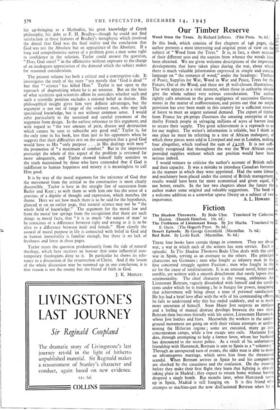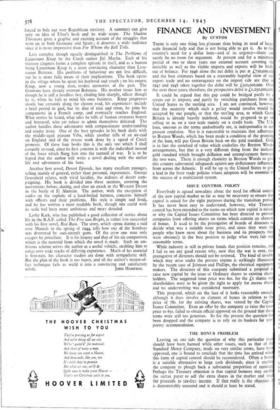Fiction
The Shadow Throwers. By Bodo Uhse. Translated by Catherine 3. Hutton. (Hamish Hamilton. 10s. 6d.) THESE four books have certain things in common. They are about war, a war in which each of the writers has seen service. Each is episodic. In The Shadow Throwers Bodo Uhse deals with the civil war in Spain, serving as an overture to the others. His principal characters are Germans ; men who fought as infantry men in the first concerted struggle against Fascism ; men who fought in the air for the cause of totalitarianism. It is an unusual novel, bitter and terrible, yet written with a smooth detachment that rarely lapses into sentimentality. The chief character is the young, ambitious Air Lieutenant Bertram, vaguely dissatisfied with himself and the condi- tions under which he is training; is hungry for power, imagining that achievement will bring about a state of personal satisfaction. He has had a brief love affair with the wife of his commanding officer, he fails to understand why this has ended suddenly, and so is made more uncertain of himself. Soon Major Jost suspects an intrigue and a feeling of mutual distrust develops between the two men. Bertram then becomes friendly with his senior, Lieutenant Harteneck, whom Jost loathes and fears. Meanwhile the workers in the under- ground movement are going on with their valiant attempts at under- mining the Hitlerian regime ; some are executed, many go into concentration camps, while a few escape into exile. Marianne Jost dies, through attempting to help a former lover, whom her husband has denounced to the secret police. As a result of his unfortunate friendship with Harteneck, Bertram is sent to Spain as a "volunteer." Through an unexpected turn of events, the older man is able to make an advantageous marriage, which saves him from the threatened scandal. When Bertram arrives in Spain he and his companions are shocked by the casualness and the confusion. On the evening before they make their first flight they learn that fighting is alrwdy taking place in Madrid; they expect to return home without having dropped a single bomb. But months later, when Harteneck turns up in Spain, Madrid is still hanging on. It is this friend who attempts to machine-gun the now disirusioned Bertram when he
6.' a.
Mi]
C
C C C
forced to bale out over Republican territory. A summary can give only an idea of Uhse's book and its wide scope. The Shadow Throwers gives a graphic and exciting account of the struggles that went on in both Germany and Spain • it deserves a wide audience since it is more impressive than For Whom the Bell Tolls.
Less complex though equally distinguished is The Problems of Lieutenant Knap by the Czech author Jirl Mucha. Each of his thirteen chapters forms a complete episode in itself, and as a human being Lieutenant Knap is a more convincing character than Lieu- tenant Bertram. His problems of behaviour are not less difficult, but he is more fully aware of their implications. The book opens in the village where he spent his boyhood and youth ; on his return, Knap, now a young man, evokes memories of the past. The Germans have already overrun Bohemia. His mother treats him as though he is still a heedless boy, chiding him sharply, officer though he is, when he fails to mind his own business. Knap progresses slowly but certainly along the chosen road, his experiences include a brief period in gaol, but by dint of trial and error, he joins his companions in a French camp, and eventually reaches England. What stories he heard, what tales he tells of human creatures beaten and betrayed, who yet refuse to admit themselves defeated. The author handles these adventures with compassionate understanding and tender irony. One of the best episodes in his book deals with the middle-aged peasant Vrba, while another tells of an air-raid on England and of the rescue work done by a squad of Czech pioneers. Of these four books this is the only one which I shall certainly re-read, since its first concern is with the individual instead of the force which flung him into the turmoil of war. It is to be hoped that the author will write a novel dealing with the earlier life and adventures of his hero.
Another first novel, Desert Episode, has many excellent passages, telling mainly of general, rather than personal, experiences. George Greenfield relates, with vivid lucidity, the ardours of desert cam- paigning. His book is divided into three sections, covering the movements before, during, and after an attack in the Western Desert in the battle of El Alamein. The author, with the exception of asides on the exploits of a hard-boiled batman, concerns himself with officers and their problems. His style is simple and fresh, and he has written a most readable book, though one could wish its scale had been more ambitious and mare detailed.
Leslie Kark, who has published a good collection of stories about life in the R.A.F. called The Fire. was Bright, is rather less successful with his first novel, Red Rain. The story, which opens during a raid over Munich in the spring of 1944, tells how one of the bombers was dcstroyed by anti-aircraft-• guns. Of the crew one man only escapes by parachute. It is his history and that of his six companions which is the material from which the novel is made. Such an am- bitious scheme serves the author as a useful vehicle, enabling him to range over wide tracks of differing experience. Much of his material is first-rate, his character studies are done with sympathetic skill. .But the plan of the book is too heavy, and all the author's matter-of- fact technique fails to wield it into a convincing and satisfactory



























 Previous page
Previous page